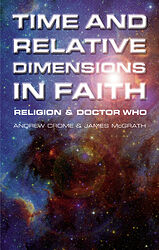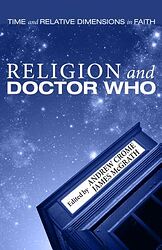
Product prices and availability are accurate as of the date/time indicated and are subject to change. Any price and availability information displayed on Amazon site(s) at the time of purchase will apply to the purchase of this product.
 |
||
|
|
||
|
|
| ||||||||||||||||||

Cover blurb: But why does Doctor Who intersect with religion so often, and what do such instances tell us about the society that produces the show and the viewers who engage with it? The writers of Time and Relative Dimensions in Faith attempt to answer these questions through an in-depth analysis of the various treatments of religion throughout every era of the show’s history. While the majority of chapters focus on televisual Doctor Who, the authors also look at audios, novels and the response of fandom. Their analyses — all written in an accessible but academically-thorough style — reveal that examining religion in a long-running series such as Doctor Who can contribute to a number of key debates within faith communities and religious history. Most importantly, it provides another way of looking at why Doctor Who continues to inspire, to engage and to excite generations of passionate fans, whatever their position on faith. The contributors are drawn from the UK, the USA and Australia, and their approaches are similarly diverse. Chapters have been written by film scholars and sociologists; theologians and historians; rhetoricians, philosophers, and anthropologists. Some write from the perspective of a particular faith or belief; some write from the perspective of no religious belief. All, however, demonstrate a solid knowledge of, and affection for, the brilliance of Doctor Who. Andrew Crome is Lecturer in the History of Modern Christianity at the University of Manchester, where he teaches and writes on English religious history and apocalyptic thought. James McGrath is the Clarence L. Goodwin Chair in New Testament Language & Literature at Butler University. His blog, Exploring our Matrix, has regular thoughts on theology, Doctor Who and popular culture. | |||||||||||||||||||||||||||||||||||||||||||

Cover blurb: But why does Doctor Who intersect with religion so often, and what do such instances tell us about the society that produces the show and the viewers who engage with it? The writers of Religion and Doctor Who: Time and Relative Dimensions in Faith attempt to answer these questions through an in-depth analysis of the various treatments of religion throughout every era of the show’s history. While the majority of chapters focus on televisual Doctor Who, the authors also look at audios, novels and the response of fandom. Their analyses — all written in an accessible but academically-thorough style — reveal that examining religion in a long-running series such as Doctor Who can contribute to a number of key debates within faith communities and religious history. Most importantly, it provides another way of looking at why Doctor Who continues to inspire, to engage and to excite generations of passionate fans, whatever their position on faith. The contributors are drawn from the UK, the USA and Australia, and their approaches are similarly diverse. Chapters have been written by film scholars and sociologists; theologians and historians; rhetoricians, philosophers, and anthropologists. Some write from the perspective of a particular faith or belief; some write from the perspective of no religious belief. All, however, demonstrate a solid knowledge of and affection for the brilliance of Doctor Who. ANDREW CROME is Lecturer in the History of Modern Christianity at the University of Manchester, where he teaches and writes on English religious history and apocalyptic thought. JAMES McGRATH is the Clarence L. Goodwin Chair in New Testament Language & Literature at Butler University. | |||||||||||||||||||||||||||||||||||||||||||||||
| Go back | ||